一般将来时讲解与练习
(完整版)一般将来时态讲解及练习和答案
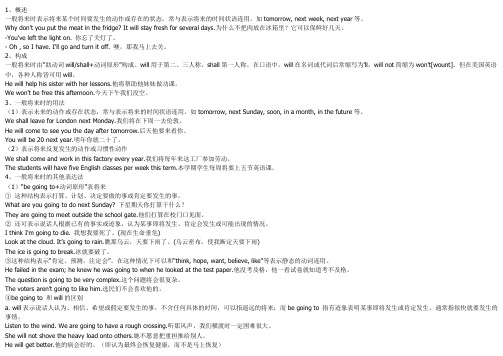
1、概述一般将来时表示将来某个时间要发生的动作或存在的状态,常与表示将来的时间状语连用,如tomorrow, next week, next year等。
Why don’t you put the meat in the fridge? It will stay fresh for several days.为什么不把肉放在冰箱里?它可以保鲜好几天。
-You've left the light on. 你忘了关灯了。
- Oh , so I have. I'll go and turn it off. 噢,那我马上去关。
2、构成一般将来时由“助动词will/shall+动词原形”构成。
will用于第二、三人称,shall第一人称。
在口语中,will在名词或代词后常缩写为'll,will not简缩为won’t[wount]。
但在美国英语中,各种人称皆可用will。
He will help his sister with her lessons.他将帮助他妹妹做功课。
We won't be free this afternoon.今天下午我们没空。
3、一般将来时的用法(1)表示未来的动作或存在状态,常与表示将来的时间状语连用,如tomorrow, next Sunday, soon, in a month, in the future等。
We shall leave for London next Monday.我们将在下周一去伦敦。
He will come to see you the day after tomorrow.后天他要来看你。
You will be 20 next year.明年你就二十了。
(2)表示将来反复发生的动作或习惯性动作We shall come and work in this factory every year.我们将每年来这工厂参加劳动。
一般将来时(讲义及答案)
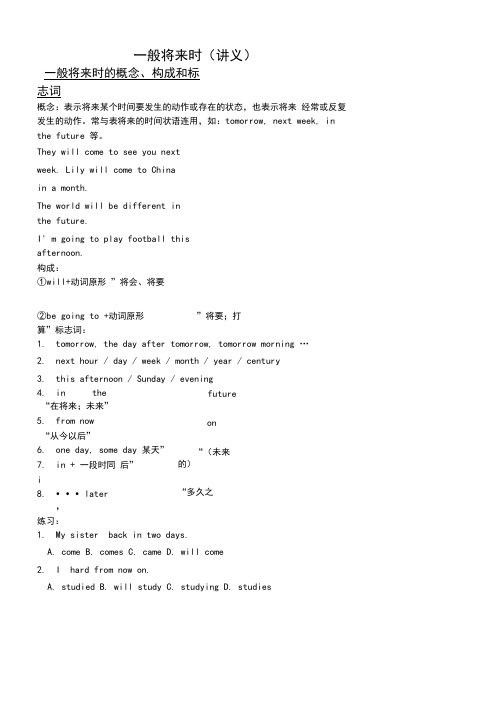
一般将来时(讲义)一般将来时的概念、构成和标志词概念:表示将来某个时间要发生的动作或存在的状态,也表示将来 经常或反复发生的动作。
常与表将来的时间状语连用,如:tomorrow, next week, inthe future 等。
They will come to see you nextweek. Lily will come to Chinain a month.The world will be different inthe future.I' m going to play football thisafternoon.构成:①will+动词原形 ”将会、将要②be going to +动词原形 ”将要;打算”标志词:1. tomorrow, the day after tomorrow, tomorrow morning…2. next hour / day / week / month / year / century3. this afternoon / Sunday / evening4. in the “在将来;未来”5. from now “从今以后”6. one day, some day 某天”7. in + 一段时同 后” i8. •••later ,练习:1. My sister back in two days.A. comeB. comesC. cameD. will come2. I hard from now on.A. studiedB. will studyC. studyingD. studies futureon“(未来的)“多久之3.后天Tcm将要离开北京-(翻径)_____________________4.中国将会变得更强大,(翻修)______________________5.They will visit Zhengzhou next month.(写出同义句)6.When will you leave for China (写出同义句)When you句式变换She will be angry with him.否定句:She will not be angry with him. /She won, t be angry with him. 一般疑问句:Will she be angry with him 回答:Yes, she will. / No, shewon , t.特殊疑问句:Who will she beangry with注意:will可缩写为'11, will not可缩写为won' t /wa u nt/练习:1.这个周末他不会去钓鱼。
一般将来时讲解及练习(含答案)
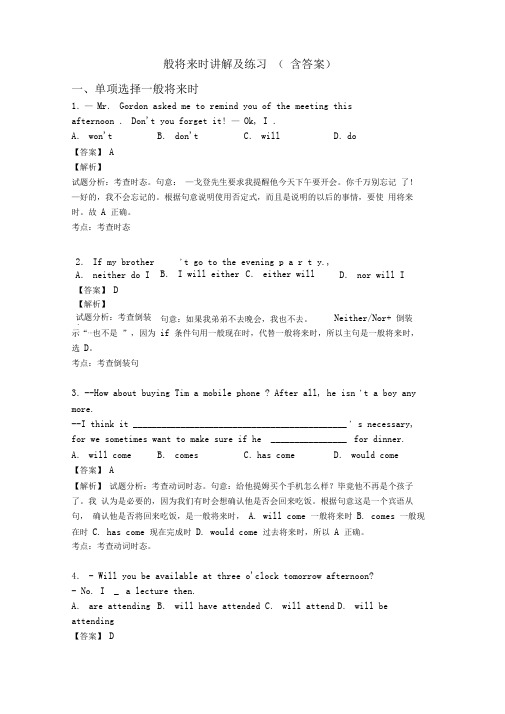
般将来时讲解及练习(含答案)一、单项选择一般将来时1.—Mr.Gordon asked me to remind you of the meeting thisafternoon .Don't you forget it! —Ok, I .A.won't B.don't C.will D.do【答案】A【解析】试题分析:考查时态。
句意:—戈登先生要求我提醒他今天下午要开会。
你千万别忘记了!—好的,我不会忘记的。
根据句意说明使用否定式,而且是说明的以后的事情,要使用将来时。
故A 正确。
考点:考查时态2.If my brother doesn 't go to the evening p a r t y.,A.neither do I B.I will either C.either willI D.nor will I【答案】D 【解析】试题分析:考查倒装句:句意:如果我弟弟不去晚会,我也不去。
Neither/Nor+ 倒装句,表示“⋯也不是”,因为if 条件句用一般现在时,代替一般将来时,所以主句是一般将来时,选D。
考点:考查倒装句3.--How about buying Tim a mobile phone ? After all, he isn 't a boy any more.--I think it _____________________________________________ ' s necessary, for we sometimes want to make sure if he ________________ for dinner. A.will come B.comes C.has come D.would come【答案】A【解析】试题分析:考查动词时态。
句意:给他提姆买个手机怎么样?毕竟他不再是个孩子了。
我认为是必要的,因为我们有时会想确认他是否会回来吃饭。
一般将来时讲解和练习
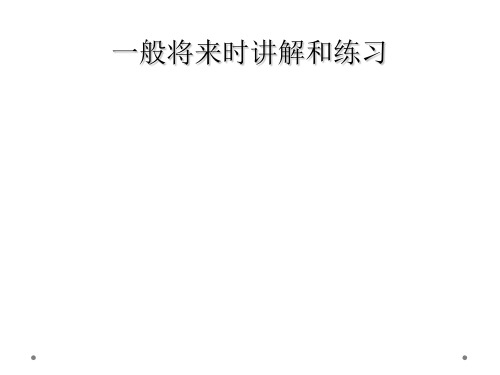
Functional Practise:
汉译英: 1.明天,我们学校将有场足球赛,我准备去看. 2.我打算和李明一起复习功课. 3.将来每个人都有一台计算机. 4.美美正在做饭.今天晚上她要把饭带到晚会上去. 5.我理想的学校将有宽大的教室和图书室. 6.学生将在电脑上与老师对话. 7.将来有学校吗?不,没有 8.我们将使用因特网在家里学习.
7. Many girls likkee_ep_i_n_g__ a pet. 8. There will be a sports meeting tomorrow.(一般疑问句)
9. Will__t_he_r_e_b_e__ a sports meeting tomorrow 10.我想将会有更多高楼,更少汽车,更少污染。
A.must B.will
C.would
D.is going to
注意:will与be going to的区别,be going to可以表示明显将要发生的情况.
3.There_B _ a basketball match this afternoon.
A.will have B.will be
C.has
注意:在口语中,所有人称都可以用will.
Be + going + to
一定句 :主语 + be ( am, is, are ) + going to + 动词原形 eg. I’m going to go there next month. 下个月我将去那里。
He is going to visit his grandparents next year. 明年他将要去看望他的爷 They are going to find a new house to live in. 他们将要找一所新房子住。 否定句 : 主语 + be ( am, is, are ) + not + going to + 动词原形 eg. He isn’t going to see the movie. 他不会去看电影。 You aren’t going to work on the farm this weekend. 这个周末你们不去家 We aren’t going to have a meeting this afternoon. 今天下午我们不开会。 疑问句 Be ( am, is, are ) + 主语 + going to + 动词原形 eg. Are you going to have a party tomorrow 明天你们要开联欢会吗? Is he going to write to his friends 他要给他的朋友写信吗? Are they going to buy a new car 他们要买一辆新车吗? 特殊疑问句 特殊疑问词 + be ( am, is, are ) + 主语 + going to + 动词原形 eg. What are you going to have tomorrow 明天你们要吃什么? What are you going to do tonight I’m going to watch the baseball gam 今晚你打算做什么?我想要看棒球赛。
初中英语主要时态系列——一般将来时讲解及练习【附中考真题及解析】
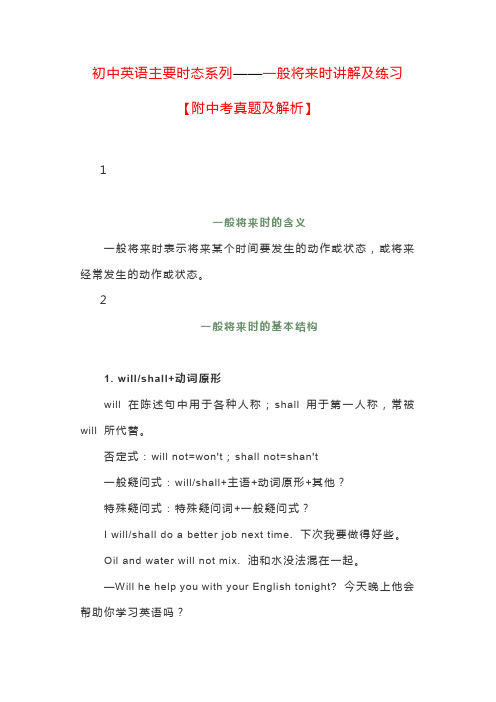
初中英语主要时态系列——一般将来时讲解及练习【附中考真题及解析】1一般将来时的含义一般将来时表示将来某个时间要发生的动作或状态,或将来经常发生的动作或状态。
2一般将来时的基本结构1. will/shall+动词原形will 在陈述句中用于各种人称;shall用于第一人称,常被will 所代替。
否定式:will not=won't;shall not=shan't一般疑问式:will/shall+主语+动词原形+其他?特殊疑问式:特殊疑问词+一般疑问式?I will/shall do a better job next time. 下次我要做得好些。
Oil and water will not mix. 油和水没法混在一起。
—Will he help you with your English tonight? 今天晚上他会帮助你学习英语吗?—Yes, he will./No, he won't. 是的,他会。
/不,他不会。
—When will you arrive for America? 你什么时候去美国?—Tomorrow. 明天。
2. am/is/are going to +动词原形否定式:am/is/are not going to +动词原形一般疑问式:am/is/are +主语+ going to + 动词原形+其他?特殊疑问式:特殊疑问词+一般疑问式?He is going to spend his holidays in London. 他打算在伦敦度假。
Look at the dark clouds. There is going to be a storm. 看那乌云,快要下雨了。
Is he going to collect any data for us? 他会帮我们收集数据吗?What are you going to do tomorrow? 明天你打算作什么?3一般将来时的用法will+动词原形与am/is/are going to +动词原形的用法虽然都表示将来发生动作或情况,一般情况下能互换。
初中一般将来时讲解练习及答案

一般将来时1.结构:谓语动词用“will + 动词原形”或“be (am / is / are) going to + 动词原形”We are going to have a meeting today.We will have a meeting today.I will go to school tomorrow.I am going to go to school tomorrow.He will leave our school next year.He is going to leave our school next year.一般将来时的标志:tomorrow, the day after tomorrow, next (week, year, month…)in 3 days, 2 days later, soon.1.用be going to do表示将来:主要意义,一是表示“意图”,即打算在最近的将来或将来实行某事。
Are you going to post that letter?How long is he going to stay here?I am going to book a ticket.另一意义是表示“预见”,即现在已有迹象表明将要发生或即将发生某种情况。
It’s going to rain.George is putting on weight; he is going to be quite fat.2.用will/ shall do表示将来:(注明shall主要用于第一人称I, we) 一是表示预见You will feel better after taking this medicine.Do you think it will rain?二是表示意图.I will not lend the book to you.Take it easy,I will not do it any longer.基本结构:She will come to have class tomorrow.Will she come to have class tomorrow?Sh e won’t come to have class tomorrow.What will she do tomorrow?肯定形式:①am/is/are going to + do;②will/shall + do.否定形式:①am/is/are going not to + do;②will/shall not + do.3. 用be doing表示将来:主要意义是表示按计划、安排即将发生的动作,常用于位置转移的动词。
(完整版)小学英语一般将来时讲解及练习

小学英语一般将来时讲解及练习一、一般将来时的定义:一般将来时表示在将来时间将要发生的动作或存在的状态,与表示将来的时间连用。
tomorrow, next day(week, month, year…),soon, the day after tomorrow(后天)等。
如:She will visit Shanghai tomorrow.二、一般将来时的构成1.一般将来时有两种构成形式:(1)主语+shall/will+do(2)主语+ be going to + do 在表示“打算到某地去时”由于谓语动词go与going重复,一般可以只说be going to a place。
三、一般将来时的用法1.(1)主语+shall/will+do (will可用于所有人称,shall只用于第一人称I和we) 这种结构不是表示自己的打算、意图或计划,而是表示未来的事实或对将来的预测等如:No one will do heavy work.Roberts will do everything for us.(2)主语+ be going to + do这种结构常用来表达自己打算做某事、计划做某事或者有意做某事。
注意:be 动词要与主语的人称和数一致,如:I am going to do some reading tomorrow.He is going to have a piano lesson next week.We are going to have a party this Friday.2.通常情况下will 和 be going to能互换,但是be going to 与will用法的也是有点区别的(1)只用will不用be going to的情况:①表示对未来时间与年龄的推测时,如:Tomorrow will be Monday.She will be thirteen next year.②表示必然发生时,如:Fish will die without water.People will die if all green plants die.(2)只用be going to而不用will的情况:如果表示已有迹象表明在不久的将来要发生的事情时,如:Look at those black clouds, It’s going to rain.3.某些动词如:go/come/leave/start/begin/arrive等,它们的现在进行时可以表示将来时,如:They are leaving for Shanghaitomorrow.My brother is coming here soon.四、一般将来时的句式变换肯定句:主语+shall/will+do主语+ be going to + do否定句:主语+shall/will+not+do(will not 可缩写成won’t)主语+ be+ not+ going to +do一般疑问句:shall/will+主语+ dobe+主语+going to+do特殊疑问句:疑问词+ shall/will+主语+do疑问词+be+主语+going to+do一般将来时练习题:一、用单词的适当形式填空。
一般将来时讲解(附习题+答案)

一般将来时讲解(附习题+答案)一、一般将来时的含义:表示动作发生在将来二、一般将来时的句型:(1) will/shall+动词原形(2) be going to+动词原形三、一般将来时的时间状语:tomorrow(明天)、the day after tomorrow(后天)、next...(下一...): next week(下一周)、next year(明年)、next month(下个月)in+一段时间(...之后): in three days(三天之后)、in the future在未来this evening(今天晚上)四、一般将来时的句型结构:(1) will/shall+动词原形(will not =won’t)(will 各种人称均可用,shall 只能用于第一人称)1)肯定句:主语+will/shall+动词原型...如:I will go to school tomorrow.我明天将会去学校He will go to school tomorrow.他明天将会去学校。
2)否定句:主语+will/shall+not+动词原型...如:I won’t go to school tomorrow.我明天将不会去学校。
He won’t go to school tomorrow.他明天将不会去学校。
3)一般疑问句:Will/Shall +主语+动词原型...如:Will you go to school tomorrow?你明天要去学校吗?Will he go to school tomorrow?他明天要去学校吗?肯定回答:Yes, 主语+will.如:Yes, I will.Yes, he will.否定回答:No,主语+will+not.如:No, I won’t.No, he won’t.4) 特殊疑问句:特殊疑问词+will/shall+主语+动词原型...如:What will you do tomorrow?你明天将会做什么?What will he do tomorrow?他明天将会做什么?(2) be going to+动词原形1)肯定句:主语+be going to +动词原型...如:I am going to buy some books tomorrow.我明天打算去买一些书。
初中一般将来时讲义【含答案】
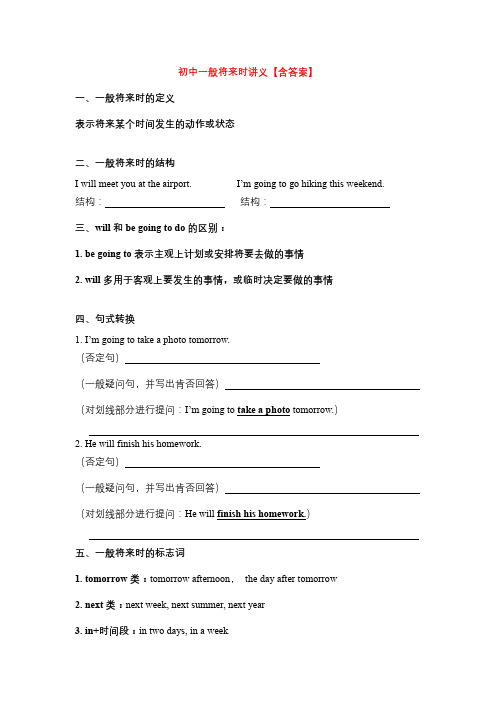
初中一般将来时讲义【含答案】一、一般将来时的定义表示将来某个时间发生的动作或状态二、一般将来时的结构I will meet you at the airport. I’m going to go hiking this weekend.结构:结构:三、will和be going to do的区别:1. be going to表示主观上计划或安排将要去做的事情2. will多用于客观上要发生的事情,或临时决定要做的事情四、句式转换1. I’m going to take a photo tomorrow.(否定句)(一般疑问句,并写出肯否回答)(对划线部分进行提问:I’m going to take a photo tomorrow.)2. He will finish his homework.(否定句)(一般疑问句,并写出肯否回答)(对划线部分进行提问:He will finish his homework.)五、一般将来时的标志词1. tomorrow类:tomorrow afternoon,the day after tomorrow2. next类:next week, next summer, next year3. in+时间段:in two days, in a week4.其他:in the future, one day, someday【课堂练习】1. We don’t know when __________ next week. Please call me when he arrives.A. will he arriveB. does he arriveC. he will arriveD. he arrives2. —How soon will he come back to Guangzhou?—I have no idea. Maybe he __________ in one or two days.A. will comeB. comesC. comeD. came3. ---will the train arrive?---It the station in 50 minutes.A. How soon; will get toB. How soon; arriveC. How long; will reachD. How far; gets to4. Will you at the bus stop at 10:30?A. meetingB. meetsC. meetD. met5. Lily and I to the concert it we free next week.A. go; areB. go; will beC. will go; will beD. will go; are初中一般将来时讲义(答案)一、一般将来时的定义表示将来某个时间发生的动作或状态二、一般将来时的结构I will meet you at the airport. I’m going to go hiking this weekend.结构:will+动词原形结构:am/is/are going to+动词原形三、will和be going to do的区别:1. be going to表示主观上计划或安排将要去做的事情2. will多用于客观上要发生的事情,或临时决定要做的事情四、句式转换1. I’m going to take a photo tomorrow.(否定句)I’m not going to take a photo tomorrow.(一般疑问句,并写出肯否回答)---Are you going to take a photo tomorrow?---Yes, I am. / No, I’m not.(对划线部分进行提问:I’m going to take a photo tomorrow.)What are you going to do tomorrow?2. He will finish his homework.(否定句)He will not finish his homework.(一般疑问句,并写出肯否回答)---Will he finish his homework?---Yes, he will. /No, he won’t.(对划线部分进行提问:He will finish his homework.)What will he do?五、一般将来时的标志词1. tomorrow类:tomorrow afternoon,the day after tomorrow2. next类:next week, next summer, next year3. in+时间段:in two days, in a week4.其他:in the future, one day, someday【课堂练习】1. We don’t know when __________ next week. Please call me when he arrives.A. will he arriveB. does he arriveC. he will arriveD. he arrives2. —How soon will he come back to Guangzhou?—I have no idea. Maybe he __________ in one or two days.A. will comeB. comesC. comeD. came3. ---will the train arrive?---It the station in 50 minutes.A. How soon; will get toB. How soon; arriveC. How long; will reachD. How far; gets to4. Will you at the bus stop at 10:30?A. meetingB. meetsC. meetD. met5. Lily and I to the concert it we free next week.A. go; areB. go; will beC. will go; will beD. will go; are。
完整版)小学英语一般将来时讲解及练习

完整版)小学英语一般将来时讲解及练习XXX: XXX XXXThe simple XXX future。
and it is used with time XXX。
next day/week/month/year。
soon。
and the day after tomorrow。
For example。
"She will visit XXX."There are two forms of the simple future XXX:1.Subject + shall/will + verb2.Subject + be going to + verbXXX to go to a place。
it is common to use "be going to a place" instead of repeating the verb "go."XXX simple future XXX can be used in the following ways:1.(1) Subject + shall/will + verb (will can be used for all persons。
while shall is only used for the first person singular and plural) is not used to express one's own plans or ns。
but rather tostate XXX。
such as "No one will do heavy work" and "Roberts will do everything for us."2) Subject + be going to + verb is often used to express one's own plans。
(完整版)小学一般将来时讲解与练习
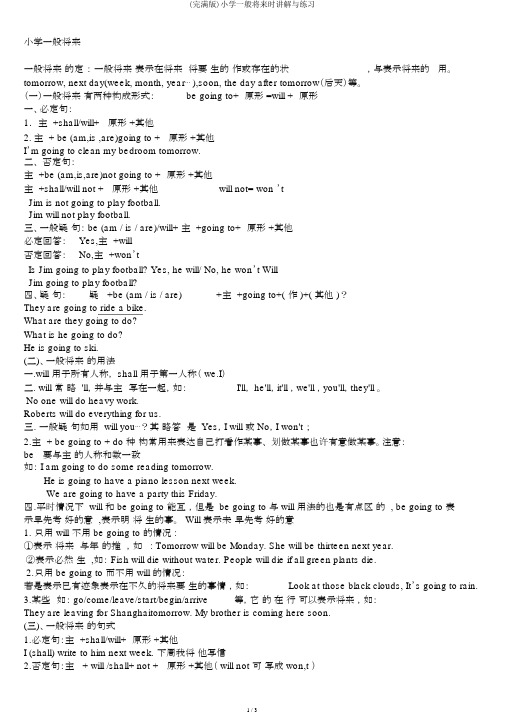
小学一般将来一般将来的定:一般将来表示在将来将要生的作或存在的状,与表示将来的用。
tomorrow, next day(week, month, year⋯ ),soon, the day after tomorrow(后天)等。
(一)一般将来有两种构成形式:be going to+原形 =will +原形一、必定句:1.主 +shall/will+ 原形 +其他2.主 + be (am,is ,are)going to + 原形 +其他I’m going to clean my bedroom tomorrow.二、否定句:主 +be (am,is,are)not going to +原形 +其他主 +shall/will not + 原形 +其他will not= won ’tJim is not going to play football.Jim will not play football.三、一般疑句: be (am / is / are)/will+ 主 +going to+原形 +其他必定回答:Yes,主 +will否定回答:No,主 +won’tIs Jim going to play football? Yes, he will/ No, he won’t WillJim going to play football?四、疑句:疑+be (am / is / are)+主 +going to+(作 )+( 其他 )?They are going to ride a bike.What are they going to do?What is he going to do?He is going to ski.(二)、一般将来的用法一.will 用于所有人称, shall 用于第一人称( we.I)二. will 常略 'll,并与主写在一起,如:I'll, he'll,it'll ,we'll ,you'll,they'll 。
一般将来时讲解+练习题
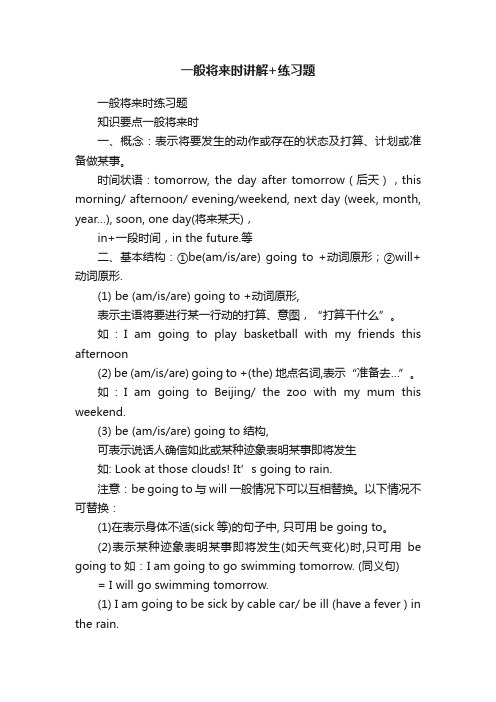
一般将来时讲解+练习题一般将来时练习题知识要点一般将来时一、概念:表示将要发生的动作或存在的状态及打算、计划或准备做某事。
时间状语:tomorrow, the day after tomorrow(后天),this morning/ afternoon/ evening/weekend, next day (week, month, year…), soon, one day(将来某天),in+一段时间,in the future.等二、基本结构:①be(am/is/are) going to +动词原形;②will+ 动词原形.(1) be (am/is/are) going to +动词原形,表示主语将要进行某一行动的打算、意图,“打算干什么”。
如:I am going to play basketball with my friends this afternoon(2) be (am/is/are) going to +(the) 地点名词,表示“准备去…”。
如:I am going to Beijing/ the zoo with my mum this weekend.(3) be (am/is/are) going to 结构,可表示说话人确信如此或某种迹象表明某事即将发生如: Look at those clouds! It’s going to rain.注意:be going to 与will一般情况下可以互相替换。
以下情况不可替换:(1)在表示身体不适(sick等)的句子中, 只可用be going to。
(2)表示某种迹象表明某事即将发生(如天气变化)时,只可用be going to 如:I am going to go swimming tomorrow. (同义句) = I will go swimming tomorrow.(1) I am going to be sick by cable car/ be ill (have a fever ) in the rain.(2) Look at those clouds! It’s going to rain.三、一般将来时的句型变化:1.肯定句:主语+ be(am/is/are) going to +动词原形或主语+ will + 动词原形. +动词原形否定句: (1)在be动词(am, is, are)后加not (2)情态动词will后加not成won’t. Eg:I’m going to have a picnic this afternoon.→ I’m not going to…..I will have a picnic this afternoon. → I will not (won’t) …2.2.一般疑问句:一调二改三问号(1)be或will调到句首(2)第一二人称互换:I/we – you;and改为or(否定与疑问句);some改为any;例如:We are going to buy some food and fruit this weekend. 或We will buy some…Are you going to buy any food or fruit this weekend? 或Will you buy any…? 3.特殊疑问句:who, what, where, when, how等特殊疑问词。
一般将来时讲解和练习
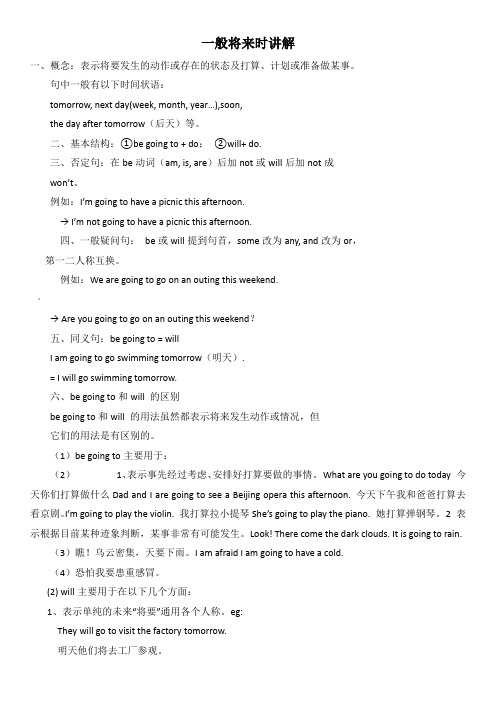
一般将来时讲解一、概念:表示将要发生的动作或存在的状态及打算、计划或准备做某事。
句中一般有以下时间状语:tomorrow, next day(week, month, year…),soon,the day after tomorrow(后天)等。
二、基本结构:①be going to + do;②will+ do.三、否定句:在be动词(am, is, are)后加not或will后加not成won’t。
例如:I’m going to have a picnic this afte rnoon.→ I’m not going to have a picnic this afternoon.四、一般疑问句:be或will提到句首,some改为any, and改为or,第一二人称互换。
例如:We are going to go on an outing this weekend.^→ Are you going to go on an outing this weekend?五、同义句:be going to = willI am going to go swimming tomorrow(明天).= I will go swimming tomorrow.六、be going to和will 的区别be going to和will 的用法虽然都表示将来发生动作或情况,但它们的用法是有区别的。
(1)be going to主要用于:(2)1、表示事先经过考虑、安排好打算要做的事情。
What are you going to do today 今天你们打算做什么Dad and I are going to see a Beijing opera this afternoon. 今天下午我和爸爸打算去看京剧。
I’m going to play the violin. 我打算拉小提琴She’s going to play the piano. 她打算弹钢琴。
英语中一般将来时的总结与练习题

英语中一般将来时的总结与练习题一、一般将来时的总结1. 一般将来时的定义一般将来时表示将来某个时间要发生的动作或存在的状态,也常用于表示将来一段时间内的经常性动作或状态。
在英语中,一般将来时主要由助动词“will”或“shall”(第一人称)加动词原形构成。
此外,“be going to + 动词原形”也可表示将来时,常用于根据目前已知的情况预测未来即将发生的动作或状态。
2. 一般将来时的常见形式•“will + 动词原形”•“shall + 动词原形”(第一人称)•“be going to + 动词原形”•“be to do”结构(表示按计划或安排即将发生的动作)•“be about to + 动词原形”(表示即将发生的动作,不能与表示将来的时间状语连用)3. 一般将来时的用法•表示将来的动作或状态,通常与表示将来的时间状语连用,如“tomorrow”, “next year”, “in the future”等。
•表示根据现有情况推测未来可能发生的动作或状态,常用于“be going to”结构中。
•表示计划、安排或打算做的事情,常与“be to do”结构连用。
4. 与其他时态的区别•与现在进行时区别:现在进行时表示正在进行的动作,而一般将来时表示将来某个时间要发生的动作。
•与现在完成时区别:现在完成时表示过去发生的动作对现在造成的影响或结果,而一般将来时则表示未来即将发生的动作。
二、一般将来时的练习题1. 选择题(1) —_____ you _____ a party next weekend?—Yes, we will.A. Will; haveB. Are; havingC. Do; haveD. Are; go to have(2) They _____ a meeting this afternoon.A. are havingB. are going to haveC. will havingD. will have(3) —_____ you _____ your homework before you watch TV?—Yes, I _____.A. Will; do; willB. Are; doing; amC. Are; going to do; amD. Will; do; am2. 填空题(1) I _____ (meet) my friend at the airport tomorrow.(2) They _____ (not go) to the zoo if it rains.(3) We _____ (have) a picnic next Sunday. Will you join us?3. 翻译题(1) 明天我要去看望我的祖父母。
- 1、下载文档前请自行甄别文档内容的完整性,平台不提供额外的编辑、内容补充、找答案等附加服务。
- 2、"仅部分预览"的文档,不可在线预览部分如存在完整性等问题,可反馈申请退款(可完整预览的文档不适用该条件!)。
- 3、如文档侵犯您的权益,请联系客服反馈,我们会尽快为您处理(人工客服工作时间:9:00-18:30)。
一般将来时一、一般将来时的定义:表示将来某一个时间将要发生的动作或存在的状态,也表示将来经常或重复发生的动作.二、一般将来时的标志:tomorrow(明天),the day after tomorrow(后天)next year(明年)next month(下一个月)in thefuture(在将来)next week(下一个星期)in+一段时间(在……之后)三、一般将来时的构成:1.主语+be(am,is,are) going to+动词原形+......例如:(1)I am going to play football tomorrow.明天我将要踢足球.(2)She is going to watch a movie the day after tomorrow.后天她要看一场电影.2.主语+will/shall+动词原形+.....说明:(1)will/shall有时可以和be going to 互换;(2)will是万能的,shall只能用在第一人称,主语是I,we.(3)will和shall的后面接动词原形例如:(1)I shall/will go to Beijing next month.(I will=I'll)下个月我将要去北京.(2)You will come to see me tomorrow.(you will=you'll)明天你将要来看我.(3)She will read English tomorrow morning.(She will=She'll)明天早上她将要读英语.四、一般将来时的句式:1.肯定句:(1)主语+be(am,is,are) going to+动词原形+......(2)主语+will/shall+动词原形+.....2.否定句:(1)主语+be(am,is,are) not going to+动词原形+......例如:(A)I am not going to play basketball tomorrow. 明天我不将踢足球.(B)She is not/isn't going to visit Shanghai next year. 明年她不将参观上海.(2)主语+will/shall not+动词原形+.....(A)I shall not go to school the day after tomorrow。
后天我不将上学了(B)I will not write my homework this evening.(will notl=I won't)今晚我不将写作业(C)She will not see a movie next week.(will not=won't) 下个星期她将不看电影.3.一般疑问句:(1)Am/Is,Are+主语+going to+动词原形+....例如(A)--Am I going to see my grandfather tomorrow? 明天我将去看我的爷爷吗? --Yes,you are.是的,你将去.(B)-- Are you going to listening to the tape tomorrow? 明天你将听录音带吗? ---No,I am not.不,我不.(C)--Is she going to Beijing next year? 明年我将去北京吗? --Yes,she is. 是的,她将去.(2)Will//shall+主语+动词原形+...例如(A) --Shall we play volleyball next class? 下一节课我们将打排球吗? --Yes,you will. 是的,你们将.(B) --Will you come here next week? 下个星期你将来这儿吗? --Yes,I will. 是的,我将.(C)--Will she teach us this term? 这学期,她将教我们吗? --Yes,she will. 是的,她将.五、补充说明:1.有些词如:go(去),come(来),leave(离开),start(开始)用现在进行时表示将来时.1例如:(1)She is coming here tomorrow. 她明天将要来这儿.(2).When are you leaving here? 你什么时间将要离开这儿?2.Be going to+动词原形+... 表示一个事先考虑好的意图,,相当于文中的打算,计划,准备例如:(1).I am going to spend my holiday in Beijing.(这里不能用will) 我打算在北京度假.(2).Where are you going to spend your holiday? 你将要到哪儿度假?3. 客观难以改变的事实,用will,而不用be going to .例如:(1).It will rain tomorrow. 明天将要下雨.(2).It will be Teachers' Day the day after tomorrow. 后天将是教师节.. 我生日将要到了(3).My birthday will come.4.There are (is) going to be与There will be是There be的将来时,都表示将来发生的动作,这两种形式可以互换使用。
如:There is going to be a class meeting this afternoon. / There will be a class meeting this afternoon. 今天下午要开班会。
there is going to have是错误的,there be就是表示“有,存在”的意思,不能和have连在一起使用六、练习.1.用词的适当形式填空.(1).The library is too old. They_______________ (build) a new one.(2).It ____________ (be) 2009 next year.(3).--What__________you___________(be)when you grow up? --I'm going to be an actor.(4).Teachers' Day is coming. I____________(give) our teachers some flowers.(5).She ___________ (spend) her holiday in Beijing.(6).It__________(rain) tomorrow.(7).Are they going to have a welcome party? Yes, we ________(be)(8).The day after tomorrow it ___________ Teachers' Day.(be)2.句型转换:(1).The girls are going to take acting lessons.(改为否定句)The girls_________ __________ to take acting lessons.(2).The students have a school trip in spring.(用next week 改写)The students ________ ________ _________ ___________ a school trip next week.(3).They are going to meet outside the school gate.(划线提问)___________ ___________ they going to meet?3.翻译句子:(1).明天我将要看望我的爷爷. __________________________.(2).后天李明将要去北京. ______________________.(3).下个星期天将要下雨. _____________________.(4).明天你将要做什么? ___________________?(5).后天是教师节. ________________.(6)下个月我将要举行一个生日晚会。
_____________________________________(7)明天将有一场排球比赛。
_____________________________________.2(8)在未来在人们的家庭将有机器人. _____________________________________(9)在一百年以后世界上将仅有一个国家._______________________________________.(10)学生们将在家在电脑上学习. ________________________________________.时态综合练习1. Look! Li Lei _____________(do) homework in his bedroom.2. Ann's grandparents enjoy ____________(read) in the village.3. Please stand up and ____________ (read) the book.4. Jim's grandfather likes __________(walk) after supper.5. -----Where ____________(be) Jim? ------He _______(be) in his factory. He ____________(work) there.6. Do you like _________(have) eggs for breakfast?7. Listen! Mary ______________(sing) in her room.8. _______your friend _________(sit) under the big tree now?9. Let's _________(go) and ________(help) the old man.10. ----Can he _______(fly) a kite? ------Yes, he can. He __________(fly) a kite with his friend there.11. I ___________(write) a book at the moment. I __________(finish) it next month.12. My family often ___________(go) for a picnic on Sunday, but next Sunday, we ___________(stay) at home.13. It _______ (be) ten o'clock now. I ________(go) to bed in ten minutes' time14. My brother usually___________(get) up late. But tomorrow he ____________(get)up early, because his friends____________(come) to see him.15.---- _______you __________(be) at home tomorrow afternoon?-----No, I _______ . I ________(go) to town with my friends.16. She _____________(come) back at 7 this evening.17. ----When ______ you _________(buy) this radio?------I _______(buy) it the year before last.18 At the moment, he ____________(be) in the library, He ____________(read ) a magazine there.19 They ____________(not be) at school the day before yesterday.20 What ___________ he __________(say) to you yesterday?21 ----___________ you always ___________(get)up so late? ----No, I _______(get) up at five yesterday.22 What _____ we ____________(do) tonight? __________we ___________(go) to the cinema?23 Where is Tom? He ______________(look) for his tie upstairs.24 What _______ you __________(do) on Sunday?25 __________(not say) that to your father, or he _________(be)angry.26 They're going __________(move) to London next year.27 When _________he ______________(telephone) me yesterday?28 Is your brother__________(write) a letter? 29 Don't ________(close) the window.30 He can ___________( go) with me. 31 I ___________(leave) here tomorrow.32 She ______________(not like) English at all. 33 What_________he ________(do) tomorrow morning?34 Mary must __________(write)the letter in English.35 Where ________you _________(buy) the TV set? In Shanghai.36 It always __________(rain) in London. Look, it _____________(rain) again.337 When _______he _________(get )up every morning? ________ he _________(get) up at 8 this morning.38 -----What ________they ________(talk) about in the classroom?-----Why is it so noisy? Well, I __________(not know).39 I ________(get) a letter from Tom last month.40 He _________(tell) us an interesting story last night.41 She _________(have) a cold last week.42 I __________(lose ) my way , so I asked a policeman for help.一.选择1.Some of the students__________football on the playground every afternoon.A.playedB.are playingC.has playedD.play2.My aunt _____ me a pair of sports shoes last Friday.A.buysB.boughtC.buyingD.has bought3. .---I have lost my pen. ---Oh, when _____ you _____ it?A.do, loseB.have, lostC.were, losingD.did, lose4.---What are you doing? ---I _____ on a new shirt.A.triesB.triedC.am tryingD.was trying5.Don't worry, Mum!No news____good news.I'm sure Daddy will come back very soon.A.isB.areC.wereD.was6.Tom often has luch at school, _____he?A.hasn'tB.don'tC.doesD.doesn't7.There _______ a class meeting next Monday.A.will haveB.will beC.is going to haveD.has8.The boy _____ to school the day before yesterday.A.would goB.doesn't goC.hasn't goD.didn't go9.Look at the clouds. It ______.A.was rainingB.will rainC.is going to rainD.has rained10.She ____her homework, didn't she? A.does B.didn't do C.did D.would do11.Listen! The twins ____ English loudly.A.readsB.were readingC.are readingD.read12.---Did you pass the maths exam? ---No, I _____.A.don'tB.doesn'tC.wasn'tD.didn't13.---Can you fly a kite? ---No, I _________. A.may not B.needn't C.mustn't D.can't14.---May I play in the street? ---No, you _______. A.mustn't B.can C.won'tD.needn't15.---Must I write down all the words now? ---No, you ____.A.mustn'tB.can'tC.won'tD.needn't16.---You must be here at six tomorrow morning. ---Sorry, I _____ be here so early.A.mustB.mayC.needD.can't17.---Must I finish the work today? ---No, you _____. You _____finish it tomorrow.A.mustn't, mayB.can't, canC.needn't, mayD.may not, can 4。
